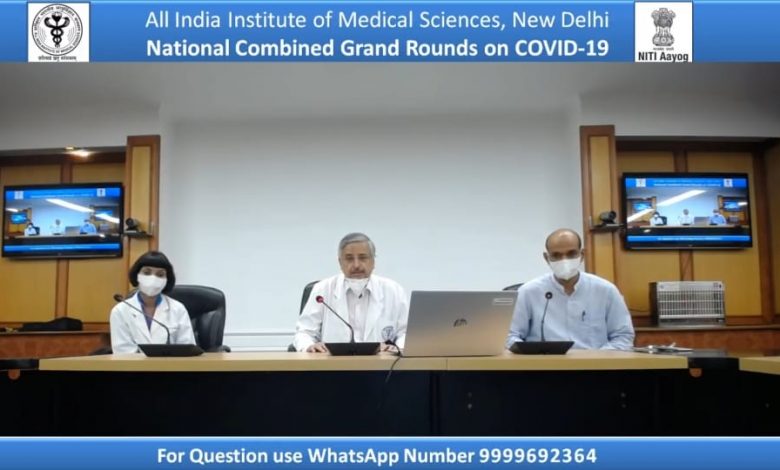NEW DELHI: Manifestations of the SARS-Cov-2 virus go beyond the pulmonary complications that previous studies suggested, experts at the AIIMS asserted on Thursday. What started out as viral pneumonia has turned into multi-systemic disease that ranges from simple Anosmia to life-threatening Encephalopathy or sudden cardiac arrest.
They also suggested that the classification of Covid-19 into mild, moderate, and severe cases based only on respiratory symptoms should be relooked into. As the Covid-19 virus is being studied, it reveals several other manifestations that indicate its impact across organ systems, observed Randeep Guleria, director at the All India Institute of Medical Sciences. Guleria shared his observation during the weekly “National Clinical Grand Rounds”, organized by AIIMS while discussing various possible extra-pulmonary complications of the Coronavirus.
The experts discussed at length about the complications developing in the body of Covid patients. Gulleria said though pulmonary manifestations continue to dominate in most cases of the pandemic, a significant rise could be seen in the number of patients having extra-pulmonary manifestations.
During the discussion, the experts presented several cases where the patients had developed complications in the body other than the respiratory system. Neeraj Nishchal, Associate professor in the medicine department at AIIMS, said what started as viral pneumonia is now turned into a multi-systemic disease. “It ranges from simple Anosmia to life-threatening Encephalopathy or sudden cardiac arrest. Almost all organs have some or other manifestation attributed to COVID-19 disease,” he added.
Ayush Agarwal, assistant professor in the Neurology department, AIIMS, said that the hospital has seen 31 cases of Covid positive strokes in the last six months. “Seventeen cases were ischemic, 13 were hemorrhagic, and 1 was CVST. All these patients were asymptomatic or minimally symptomatic for pulmonary manifestation,” he informed.
Agarwal added that brain stroke was the primary neurological manifestation found in Covid positive cases. “However, it happens only in patients with severe infections and older with multiple vascularis factors,” he said.
Deepti Siddharthan, assistant professor in the cardiology department, AIIMS, observed that a 58 per cent increase in outer hospital cardiac arrest cases correlated with Covid has been recorded since the pandemic started. She also said that cardiovascular involvement in Covid infection might infest as myocardial injury and acute coronary syndromes.
“Cardiac conduction disturbances can also be associated with Covid-19 infection irrespective of the severity of the disease and myocardial involvement,” Siddharthan added. However, Siddharthan also said that the effect of cardiovascular manifestation seems limited and long-term follow up studies could help to identify the natural course in such patients.
Apart from discussing the extra-pulmonary manifestations, the experts suggested that classifications of Covid-19 based on respiratory symptoms should be relooked at through several presentations.
They presented cases where Coronavirus patients had life-threatening manifestations like stroke and heart blocks. However, the patients were categorized as asymptomatic or mildly symptomatic.
“It is a matter of further study to ascertain whether SARS-COV-2 is the culprit in these extra-pulmonary manifestations or just an innocent bystander which happens to be at the wrong place at the wrong time. However, the classification of Covid-19 into mild, moderate, and severe cases based only on respiratory symptoms should be relooked into to incorporate other organ involvement,” Nischal suggested.







